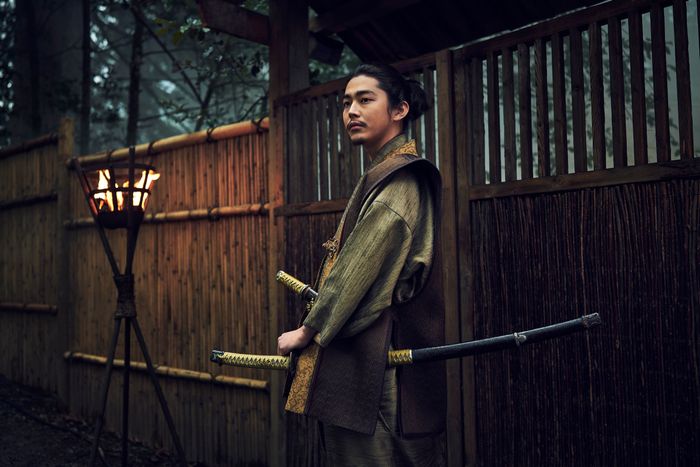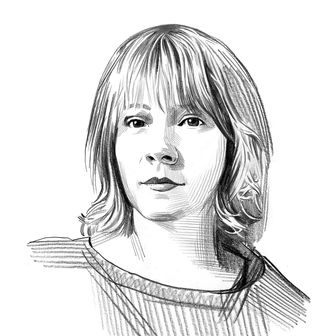
Spoilers for Shōgun episode seven, “A Stick of Time.”
Shōgun is all about what transcends culture and what stays firmly in its own fief. It turns out “failson” is a concept that can apply beyond our current place and time, as Yuki Kura’s translator explains the idea — a scion of a great man who can never measure up to Daddy — and how it fits his character, Yoshii Nagakado. Nagakado was the overeager son of Toronaga (Hiroyuki Sanada), the Machiavellian Daimyo around whom Shōgun’s various plots revolve, who possessed an almost puppy-dog-like need to prove himself on the battlefield and to his father. But alas, he was never a player; he just got played. His rash decision to execute a samurai hastened the war between his father and the other regents, and then he died by slipping in a brothel’s onsen after trying to pull a Hamlet on his uncle (Eita Okuno).
With this giant whoopsie, Nagakado joins the failson canon alongside Arrested Development’s Gob Bluth and Succession’s Kendall Roy. But his character’s ignoble end hasn’t fazed Kura, who is about as new to acting as Nagakado was to lording over people — Shōgun was his first international show and first shoot abroad — and says he couldn’t have had a better mentor than his onscreen father.
Having a death scene that’s so plausible, does that get in your head? How careful are you stepping out of the shower now?
Quite so, especially at those hot springs and public bathhouses in Japan. They have slippery areas, so I tend to be more careful in those areas after this experience.
Have you died onscreen before? How does this one rate?
I’ve shot death scenes before, but certainly nothing like this one, where you kind of inflict it upon yourself. There is a sort of awkward silliness in that, but at the same time, it’s very real. It’s certainly the most impactful one that I’ve experienced.
Shōgun really undercuts a lot of traditional grand narratives. It doesn’t do the heroic moves. What’s that like as a performer?
It’s quite complex. I read the book, obviously. There were a lot of things that were difficult to understand with just one read. This being a period show, the lives are far away from the life that I live in right now. Even in the script, which characters are contemplating what, and what the next move is — getting to watch the episode now, I’m so impressed by how it all came together, and it all makes sense. The fact that all these complex elements come together in one piece is quite wonderful.
This is a concept that is maybe going to be hard to translate: There’s a robust Shōgun fan community online, with memes and everything, and your character is being called a “failson.”
This is my first time hearing it!
Do you feel like that’s fair?
Yes, and it’s great that there’s excitement around the show.
What was going through Nagakado’s mind as he died? What does he think happens next for his dad?
He was quite frustrated by his father’s inaction, not choosing to go to the battle. That frustration led him to, of course, that action at the very end of episode seven. Now that he’s dead and probably in heaven, it’s likely that he’s hoping that his father will go to battle and face his enemies.
He clearly craved some emotional intimacy with his father. Do you think there’s a different time, definitely not the sengoku era, when that relationship could have flourished?
Like you said, the sengoku period is such a difficult time. It is a matter of life to death, and there is a great deal of tension in everyday life. But what still somewhat holds true today is the way that fathers in Japan — perhaps it’s a little bit different today, but still Japanese fathers are typically quite severe, of few words, and such was the case with Toronaga. But throughout the show, there are moments of expressions of love toward Nagakado — through action, not through words.
Maybe he didn’t know as clearly as he could have, but he was quite a fortunate, happy person, considering all the mistakes he made, that he was never killed or anything. And the fact that what happens to him at the end of this episode really triggers what is to happen to his father next, I think that’s really also a testament to that. There was a great deal of love.
Did working on this show change your relationship to communicating with other people? Translation is so key to the story, but also, as you just said, so much of the storytelling of the show is done through action, because to speak your feelings out loud is so dangerous.
There’s a lot of parallels in the experience of shooting Shōgun and working on set in an English-language environment. My English is not very good, so when I’m trying to communicate, I am paying attention to the eyes and the body language. There is a greater emphasis and appreciation for communicating with other people not through words, but through other means.
What was it like to see medieval Japan re-created in British Columbia?
Because of the scale, something like this would have not been possible to create in Japan. Canada has this massive land. A very realistic, authentic Japan was created in Vancouver and that was very impressive. As a working actor in Japanese films and TV, it was a great honor to be part of it. It was a very big first step for me personally. It was my very first time being abroad, working on a non-Japanese, international show. So it was very interesting to learn about different systems of filmmaking.
This is a silly aside, but did you have poutine while you were in Canada?
Yes, I did try it many times. Especially with the horse team. They were always eating poutine.
Let’s talk about the sword training. Nagakado may be a failson, but he’s still pretty good at beheading people. What was it like picking up that skill?
I trained for about a month at a dojo in Japan, and then once I came to Vancouver, there was a boot camp for about a month. I brought a bamboo sword, and I would always be practicing. Sanada-san, often when I was shooting he would give advice or adjust my positions. Not only that, but when there was free time, he would help train me. Sanada-san is one of the very, very top figures when it comes to tate, the tactics of Japanese-style sword fighting for period shows. It was such a fortunate and wonderful experience to have him help me train. For example, in episode four, that cannon scene, there’s quite a bit of action, and Sanada-san really helped hone my movements. There are different ways to hold the sword, and he helped me figure out what works best for me.
It must be really exciting to join the jidaigeki canon with such a legend in the genre.
This was my very first time being part of jidaigeki. And not only that, when we shot in Vancouver, I’d only been working as a professional actor for around three years. It was my first international show, and I could not have asked for a better environment and circumstances to do that.
In American film schools, we’re taught that jidaigeki is almost like American cowboy movies. It’s like the story we tell ourselves about our history, and I wonder what putting those costumes on and living in that world does to your relationship to Japan’s history.
This particular time period had both good and bad in so many different ways. But in terms of what relates to me today as an actor, it’s this idea that you don’t really verbalize everything. Acting in this, there’s so many technical elements, which could be called constraints, especially important gestures. It’s almost a different sport compared to contemporary TV.
Does it make you think differently about the history you learned in school, now that you’ve kind of lived it?
It’s so different from what I learned in school. Typically you just learn the facts and events that took place, but playing these characters, you really get to tap into the inner thoughts or feelings of these figures.
One thing that was very interesting to learn and think about came up a lot while we were shooting: The katana you use in battle, when you cut somebody, you have all this blood on the blade. It coagulates, and once you do the first pass, your second cut wouldn’t be as sharp. So if you really think about it, more likely those battles were a lot more hand-to-hand. It’s not as clean and beautiful as it is often portrayed.
Of all of the aristocratic hobbies that you got to do as part of this — sword fighting, falconry, horseback riding — are there any that you want to continue?
Definitely horseback riding. It felt like it really suits me, being in nature, being in touch with the horses. It really helped me, mentally, to be able to relax. It’s also helped me physically. I felt like I was in better shape. That’s something I would like to continue.
So not falconry, then.
Kowai.
Translator: The bird was scary.
Oh, I know what kowai means.
[Laughs.] The bird was very smart and very well behaved. But yeah, still a little bit scary. Because she eats raw meat.
This interview has been edited for content and clarity.


